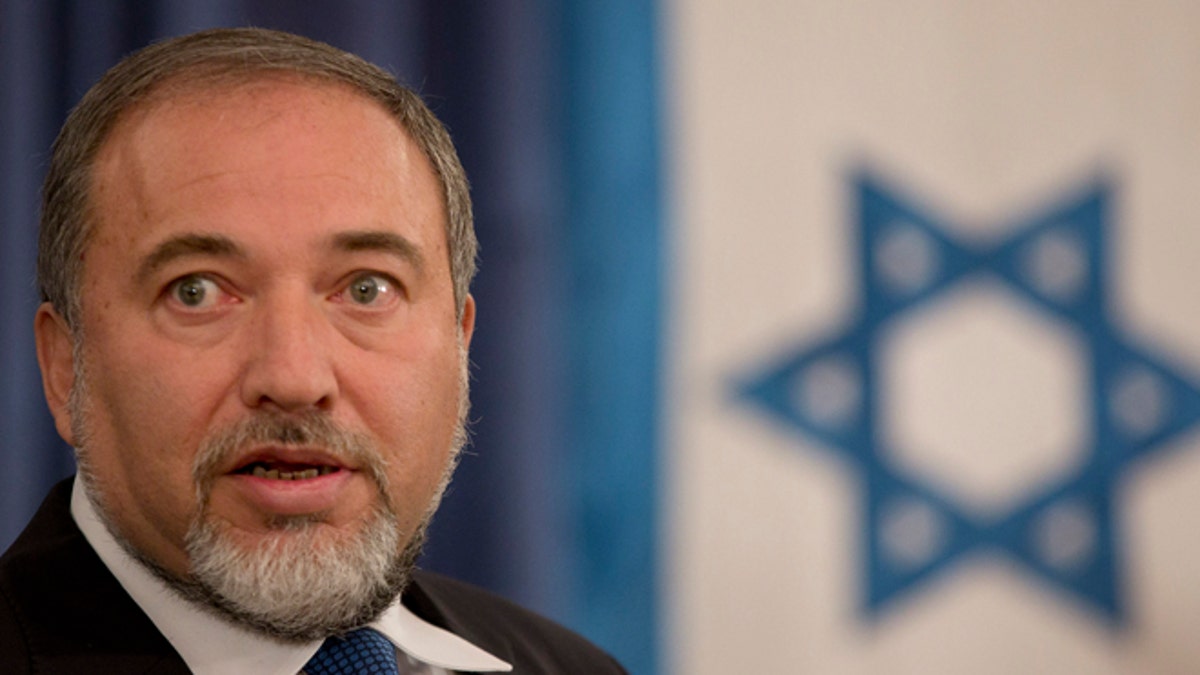
Sept. 13: Israeli Foreign Minister Avigdor Lieberman gives a speech at the Foreign Minister office in Jerusalem. (AP)
JERUSALEM – Israeli Foreign Minister Avigdor Lieberman said Sunday that Israel would not agree to reevaluate its peace deal with Egypt, days after the latest attack along the shared border killed an Israeli soldier and three gunmen.
In a bid to restore security to the increasingly lawless Sinai peninsula, Israel and Egypt have agreed to temporarily waive limits on troops included in the historic 1979 peace deal, allowing Egypt to send heavier weaponry into the vast desert region which borders Israel.
But there have been calls in Egypt for more permanent adjustments to the peace accords, a cornerstone of regional stability.
"There is no chance that Israel will agree to any kind of change" to the peace deal, Lieberman told Israel Radio. "The Egyptians shouldn't try to delude themselves or delude others and they should not rely on this demand," he said.
The temporary changes to the troop count in the Sinai have made Israel jittery. Israel welcomed a sweeping crackdown by Egypt, which deployed armored personnel carriers and attack helicopters to root out militants in the Sinai peninsula this summer, but it balked once Egypt sent in tanks, some of which were removed after Israel complained.
While the tanks were not aimed at Israel and it does not consider them a strategic threat, Israeli officials said they were concerned about the precedent and that the move should have been coordinated. Egypt claims that it has coordinated the security sweep with Israel.
The operation scored some successes, but violence in the region persists. On Friday, a shootout along the border between Israeli troops and gunmen left one soldier and three assailants dead. A shadowy Egypt-based, Al Qaeda-inspired group called Ansar Jerusalem has claimed responsibility for the attack, the latest incident in the deteriorating security situation in the Sinai since the fall of longtime Egyptian leader Hosni Mubarak last year.
Since Mubarak's 2011 ouster, tensions between Israel and Egypt have grown, particularly since this summer's election of Mohammed Morsi as president. Morsi, an Islamist who hails from the Muslim Brotherhood, has been cooler to Israel than his predecessor and concerns have risen there over the fate of the peace deal.
While it has said it would abide by the peace agreement, the Muslim Brotherhood has repeatedly called for a revision. Many Egyptians contend the troop limits infringe upon national sovereignty.
Lieberman said the number of troops wasn't relevant, suggesting the Egyptian military was not prepared to tackle the insecurity.
"The problem in Sinai is not the size of the forces, it is their readiness to fight, to put pressure and to carry out the job as is needed," he said.
Speaking on Army Radio, Defense Ministry official Amos Gilad also highlighted the importance of protecting the peace agreement but did not discuss Israel's willingness to make changes to it. He said any change would have to be agreed to by both parties.
